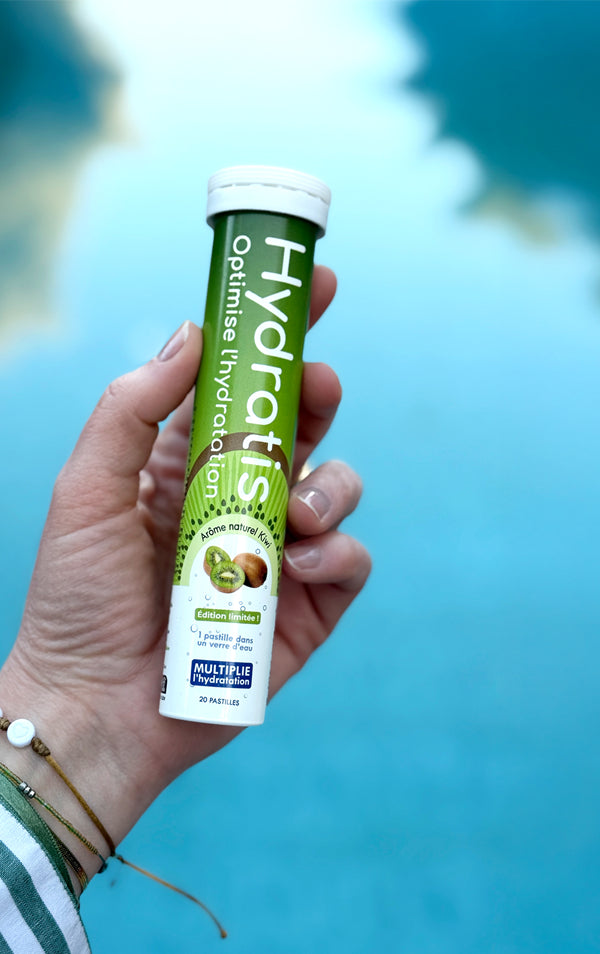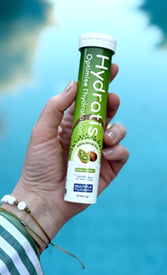many people each year. Most often resulting from a viral or bacterial infection, it disrupts the delicate balance of the digestive system, leading to a series of unpleasant symptoms such as nausea, vomiting , diarrhea, and abdominal cramps. In cases of gastroenteritis, the rapid and frequent evacuation of bodily fluids can quickly exceed the body's ability to replenish them through regular fluid intake. This is especially true if appetite is reduced, which is common when suffering from gastrointestinal disorders. In addition, the body's ability to effectively absorb fluids can be compromised during this illness, making fluid replenishment even more difficult. Therefore, drinking water, and therefore rehydrating, are essential aspects to provide the body with an adequate intake of water both after and during these episodes.
Identifying Dehydration: Symptoms and Warning Signs
What is dehydration?
Dehydration is a condition in which the body loses more fluids and electrolytes than it takes in. This is a particularly worrying phenomenon during gastroenteritis. This digestive condition, often accompanied by vomiting and diarrhea , significantly accelerates the loss of body fluids. These symptoms cause not only water loss , but also a significant decrease in essential electrolytes such as sodium , potassium and chloride , which play a fundamental role in maintaining normal bodily functions, including fluid balance, nerve transmission and muscle contraction.

In this context, it becomes imperative to quickly recognize the signs of dehydration to avoid potential complications. This is especially important in vulnerable populations, such as young children, the elderly, and those with chronic illnesses, in whom the effects of dehydration can be more rapid and severe.
How to recognize dehydration?
Here are some signs and symptoms to watch for to identify and avoid dehydration:
Dry mouth and tongue: This is an early and significant indicator of dehydration, particularly in cases of gastroenteritis. This condition occurs when the mucous membranes of the mouth and tongue lose their natural moisture and become noticeably dry and sticky. This unpleasant sensation is often accompanied by a decrease in saliva, making both swallowing and speaking difficult.
Reduced urinary frequency and dark urine: Normally, a healthy adult should urinate about six to eight times a day, but this frequency can decrease significantly when the body is lacking fluids. This decrease in urinary frequency is a clear indicator that the body is trying to conserve available water, thus limiting the amount of urine produced. When the body is dehydrated , urine can become noticeably darker in color, ranging from dark yellow to amber. This color is due to a higher concentration of waste products and chemicals such as urea, which the kidneys filter from the blood. When the body is well hydrated, these waste products are diluted with more fluids, making the urine lighter.
Unusual fatigue and lethargy: When the body lacks fluids, every cell and organ is affected, which can lead to feelings of extreme fatigue, lack of energy, and general weakness. Dehydration affects blood circulation and can reduce the supply of oxygen and essential nutrients to the muscles and brain. This can lead to muscle weakness and decreased endurance, making physical activities more difficult.

Dizziness or lightheadedness: When the body loses a significant amount of fluid, blood volume can decrease, reducing the pressure the blood exerts on the blood vessel walls. This drop in blood pressure can lead to insufficient oxygen and nutrients reaching the brain, causing dizziness or lightheadedness.
Our hydration tips during gastroenteritis
Drink fluids in small amounts
It can be difficult to consume large amounts of fluids at once. Opt for drinking water in small, regular sips instead of drinking large volumes of water or other fluids at once. This effectively allows fluids to be gently reintroduced into the body without risking aggravating symptoms such as nausea or vomiting. Clear soups, vegetable broths, and herbal teas can help! There are also Hydratis solutions that will help rehydration , while providing essential electrolytes that can be lost in cases of gastroenteritis. Water-rich fruits, such as watermelon or peach, can also be sources of hydration , while being gentle on the digestive system .
Using Hydratis rehydration solutions

Hydratis is a hydration solution specially designed to meet the needs of people suffering from water and electrolyte imbalances , as is often the case during gastroenteritis. Indeed, these carefully developed solutions offer a rich and optimal blend of salts, sugars, and minerals that ensure rapid and efficient absorption of water. This will allow rapid hydration without overloading or further irritating the digestive system. Our products are formulated to provide a precise balance between hydration and flavor, making them more pleasant to consume while being effective in boosting the body! As for its use, we advise you to put one tablet in 250ml of water and take small quantities regularly, to be renewed throughout the day as soon as you feel the need (e.g. every 2-3 hours).
Avoid certain drinks
Caffeinated beverages such as coffee, tea, and some sodas, as well as carbonated drinks and highly sugary fruit juices, can often worsen diarrhea symptoms and, therefore, exacerbate dehydration.
Daily prevention and hydration
Preventing dehydration is an important aspect of health that goes far beyond managing illness. Adequate daily hydration plays a fundamental role in maintaining optimal health and contributes to many aspects of physical and mental well-being. Insufficient fluid intake can lead to a variety of health problems, from fatigue and difficulty concentrating to more serious issues such as kidney stones or low blood pressure . If you notice signs of severe dehydration or if symptoms persist, seek medical advice!
To effectively manage a gastro episode, stay alert to the signs of dehydration and ensure the application of appropriate hydration strategies. Following these water losses, we actually recommend drinking water regularly, throughout the day , and not just in response to thirst, which is often a late sign of dehydration! Our hydration solutions are designed to help maintain optimal water balance , particularly for active people or those living in hot climates where fluid loss can be accelerated. We invite you to visit us in pharmacies or on our website hydratis.co and don't forget to stay well hydrated :)
Bibliography
National Library of Medicine. June 12, 2023. “Viral Gastroenteritis” - https://www.ncbi.nlm.nih.gov/books/NBK518995/
Improved. October 27, 2023. “Adult gastroenteritis: what to do?” - https://www.ameli.fr/assure/sante/themes/gastro-enterite-adulte/bons-reflexes-que-faire
Improved. December 6, 2023. “Dehydration” - https://www.ameli.fr/assure/sante/urgence/pathologies/deshydratation
National Library of Medicine. October 3, 2022. “Adult Dehydration” - https://www.ncbi.nlm.nih.gov/books/NBK555956/
ScienceDirect. September 21, 2023. “Emergency department assessment and management of children with gastroenteritis” - https://www.sciencedirect.com/science/article/pii/S2588994X23000696?via%3Dihub






